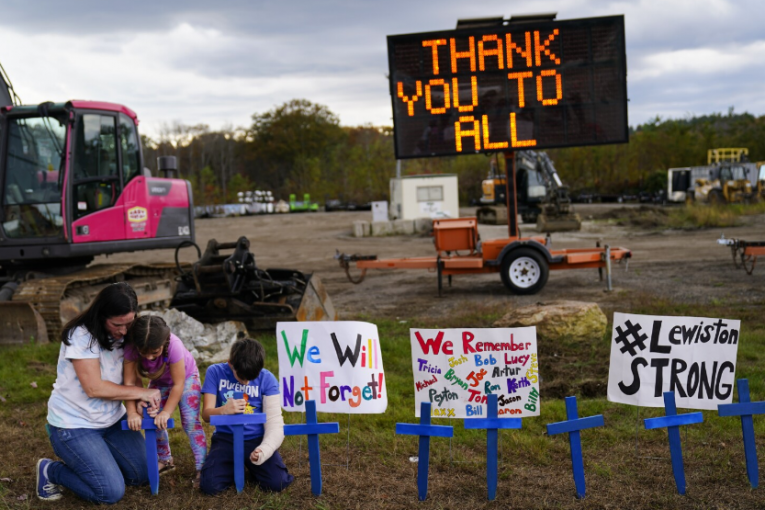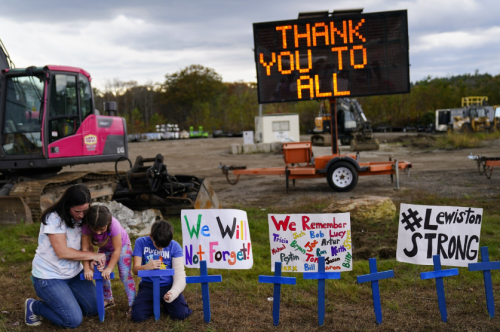

LEWISTON— According to the Gun Violence Archive, the recent mass shooting in Lewiston, Maine marks the 565th mass shooting in the United States, just this year. There have been more mass shootings than days in 2023 in the United States. That equates to almost two mass shootings every day. How many deaths will it take before the United States government cracks down on stricter gun laws?
The United States has long grappled with the alarming issue of gun violence. Recent incidents have only intensified the debate on gun control. This calls attention to the urgent need for stricter regulations and comprehensive reform. As the nation mourns the 18 lives lost in the Lewiston mass shooting, it’s time to take a closer look at the prevalence of mass shootings and the growing demand for stricter gun control measures.
Mass shootings in the United States have become a dishearteningly familiar headline. From the tragedy at Sandy Hook Elementary School in 2012 to the horrifying scenes at Parkland, Florida, in 2018 and the racially motivated shooting in Buffalo, New York in 2022, Americans are no strangers to the senseless violence that unfolds all too often.
Mass shootings have surged in frequency, each new event shattering previous records. The Gun Violence Archive, a nonprofit organization that tracks incidents of gun violence, recorded a staggering 647 mass shootings in 2022 alone. This marked a substantial increase from the 417 incidents reported in 2019. While mass shootings are not exclusive to the United States, the country’s frequency and severity stand out on the global stage.
The statistics are stark, and the calls for stricter gun control measures have grown louder. Advocates argue that these incidents are not isolated events but symptomatic of a broader problem in American society, one exacerbated by the ease of access to firearms. A series of actions must be immediately taken to address the issue of gun violence in America.
One of the key demands of gun control advocates is the implementation of universal background checks for all gun buyers. The current system allows certain individuals to evade background checks, a glaring loophole that needs immediate closure. Only 17 states have laws that require universal background checks for firearms purchases.
A ban on assault weapons and high-capacity magazines is another pressing issue. These firearms, designed for rapid and devastating firepower, have been used in many mass shootings and have lead to higher casualty rates. In instances of mass shootings, 77.2% used handguns and 25.1% used assault rifles.
Introducing mandatory waiting periods between the purchase of a firearm and its delivery to the buyer can serve as a “cooling-off” period. This would enable more thorough background checks and reduce impulsive acts of violence. “Red flag” laws, allowing temporary firearm removal from individuals deemed a threat to themselves or others, have gained traction in multiple states. Such states include California, New York, Virginia, and Florida. Advocates argue that such laws can prevent tragic events and promote community safety.
Recognizing the importance of addressing underlying mental health issues is paramount. Increased investment in accessible and affordable mental health services can prevent potential acts of violence. The role of mental illness in mass shootings isn’t clear cut but plays a role 10% of the time.
Despite the urgency of the situation, stricter gun control measures face resistance. Advocates for gun rights argue that responsible gun ownership is a fundamental right enshrined in the Second Amendment. They contend that further regulation encroaches on these rights and stricter laws may not effectively prevent individuals with malicious intent from committing violent acts. The challenge lies not only in crafting effective policy but also in addressing the deeply rooted cultural and social factors contributing to gun violence. Poverty, inequality, and inadequate mental health services are underlying issues that need comprehensive solutions.
While the gun control debate continues in the United States, it’s important to consider how other nations have approached this issue. Countries with stricter gun control regulations, such as Australia and many European nations, have seen significantly fewer mass shootings and lower rates of gun violence. Learning from their experiences can help inform potential policy changes in the United States.
The prevalence of mass shootings in the United States is a disturbing reality that cannot be ignored. The need for stricter gun control measures is an urgent matter that deserves careful consideration, political action, and an open national dialogue. It seeks to strike a balance between responsible gun ownership and public safety. By addressing existing loopholes, regulating the sale of firearms, and promoting comprehensive reform, the United States can work towards reducing the frequency and severity of mass shootings.
The task at hand is formidable, but the stakes are far higher. Each mass shooting leaves a trail of pain and suffering that extends far beyond the immediate victims. It is time for the nation to unite by putting aside partisan differences to take meaningful steps toward a safer and more secure future. The path forward may be difficult, but the price of inaction is much higher.




